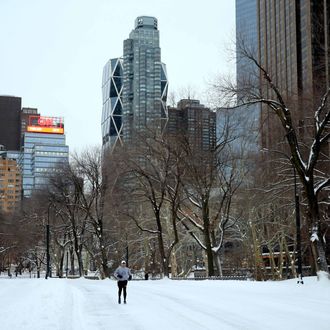
Late last night, I spent a lot of time staring out my window, willing it to snow, and then snow harder. At the same time, I refreshed my Twitter timeline, wondering if maybe someone else in a different part of the city were seeing the start of the “historic,” “raging blizzard” we’d been told to expect. I fell asleep after 1 a.m., remembering Mayor Bill de Blasio’s words from earlier that evening and hoping that maybe this was still “literally the calm before the storm.”
Obviously, when those of us in New York City woke up this morning, we learned our blizzard had turned out to be a bust (though Long Island did get about two feet of snow). It’s an odd thing, to be disappointed that we didn’t get some meteorological catastrophe. But those who were lucky enough to easily be able to stay home today had been starting to view the impending storm as a kind of bonus winter holiday, and the reality turned out to be a pretty big letdown.
Expectations have a funny effect on our happiness, as many psychologists have discovered using a variety of creative experiments over the years. For example, a clever study by behavioral scientist Dan Ariely (which we wrote abut last month) surveyed partygoers before and after the highly anticipated New Year’s Eve parties of 1999, and found those with the highest expectations about their millennium celebrations were more likely to report subsequent disappointment with the night’s actual events. Ariely and his team suggested that the people with the highest expectations were the most likely to closely monitor whether those expectations were indeed being met, which — when they weren’t — would ultimately lead to greater disappointment.
The same thing happens when a friend hypes a book before you have the chance to read it; one study of reader reviews of novels that had been short-listed for prestigious awards from 2007 to 2011 found that readers’ opinions of the books fell after the honor was announced, even as sales of those books increased. Unrealistically high expectations may even set us up for marital disappointment, according to research led by Ohio State University psychologist James McNulty, who told the American Psychological Association, “A therapist should point out [a couple’s] problems and help couples deal with them, but also consider helping them to limit their unrealistic expectations.”
The bait-and-switch of not getting something you were hoping for is rough even at the neurological level, as research on dopamine, the neurotransmitter associated with pleasure, suggests. As Talia Lerner explained on Stanford University’s Neuroblog,”dopamine neurons, which fire at some background rate, fire more in response to unpredicted, but not predicted, rewards. Additionally, if you’re expecting a reward and don’t get it, the dopamine neurons fire less.” Unexpected pleasure is far better than expected pleasure that never materializes.
One defense mechanism to protect against the crushing disappointment that often follows overly high expectation is, naturally, to set your expectations lower — some might simply call this being realistic. The practical-minded Dutch authors of a 2003 paper (titled “Blessed are those who expect nothing“) on this subject phrase it this way:
People perceive unexpected positive outcomes as more attractive than expected positive outcomes and unexpected negative outcomes as more repulsive than expected negative outcomes. Thus, irrespective of whether an outcome is favorable or unfavorable, the lower one’s initial expectations, the greater one’s satisfaction or the less intense one’s disappointment with the actual outcome. Hence, when people are faced with uncertainty regarding the occurance of a desirable outcome, they may attempt to protect themselves from the experience of disappointment by underestimating their chances of obtaining the outcome in question.
This strategy is sometimes called defensive pessimism, which is essentially a term to neatly describe the old saying, “Expect the best, prepare for the worst” — although that still doesn’t justify preparing for the snow with all that Whole Foods kale.




